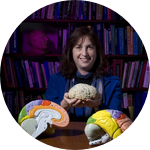About This Project
People who have had a brain injury often complain of difficulty with memory. The worst part is often the ability to remember to do things, like take medications or buy milk at the store. We have developed a number of techniques to try to improve this memory in people with brain injury. Now we want to do some measures of their brain activity to see if it gets better after the treatment.
Ask the Scientists
Join The DiscussionWhat is the context of this research?
Traumatic brain injury (TBI) effects approximately 800 of every 100,000 persons in the United States and is the leading cause of death and disability in Americans ages 1-40 with annual costs estimated at $60 billion. Of the many cognitive and emotional changes associated with TBI, survivors perceive prospective memory (PM) as the most important and performance on PM tasks is more highly correlated with everyday functioning than performance on traditional memory tasks. PM training has a high rate of success and improvement in PM functioning greatly enhances life satisfaction, independence and productivity of TBI survivors.
What is the significance of this project?
Current treatments for PM deficits tend to focus on teaching people to compensate, thus are effective in limited contexts and cannot generalize to daily life. There is growing evidence that repetitive drills delivered with increasing time intervals may be effective at restoring PM ability. There are still a number of unanswered questions related to generalization and measurement of efficacy.
In addition, most studies to date have been single case studies. Randomized controlled trials are needed to demonstrate the effectiveness of cognitive rehabilitation treatments (CRT) themselves. Many studies have not measured generalization to daily life and outcome measures are not be clearly defined. There is little value to a rehabilitation technique that does not generalize to daily life.
What are the goals of the project?
This project will measure brain activity, using EEG and fMRI before and after treatment for PM. This will help us to answer the question of whether this treatment is effecting brain functioning and thus will help to explain the ways in which this treatment may or may not be helpful.
Budget
This funding is essential for this initial project. Most of the funds are to compensate the participants for being willing to go through the treatment and the EEG or fMRI to measure brain change. In addition this would allow for an undergraduate student to work on the project for a semester.
Meet the Team
Sarah Raskin
I am a Board Certified Clinical Neuropsychologist and Professor of Psychology and Neuroscience at Trinity College in Hartford, Connecticut. I received a BA in Behavioral Biology from Johns Hopkins University and a PhD in Neuropsychology from the City University of New York Graduate Center. I have published articles investigating neuropsychological functions and cognitive rehabilitation for a variety of disorders, including brain injury. I co-authored the Memory for Intentions Test (MIST) published by Psychological Assessment Resources. I am co-author with Catherine Mateer of Neuropsychological Management of Mild Traumatic Brain Injury, published by Oxford University Press (2000) and the editor of Neuroplasticity and Rehabilitation, published by Guilford Press (2011).
Project Backers
- 2Backers
- 1%Funded
- $34Total Donations
- $17.00Average Donation


